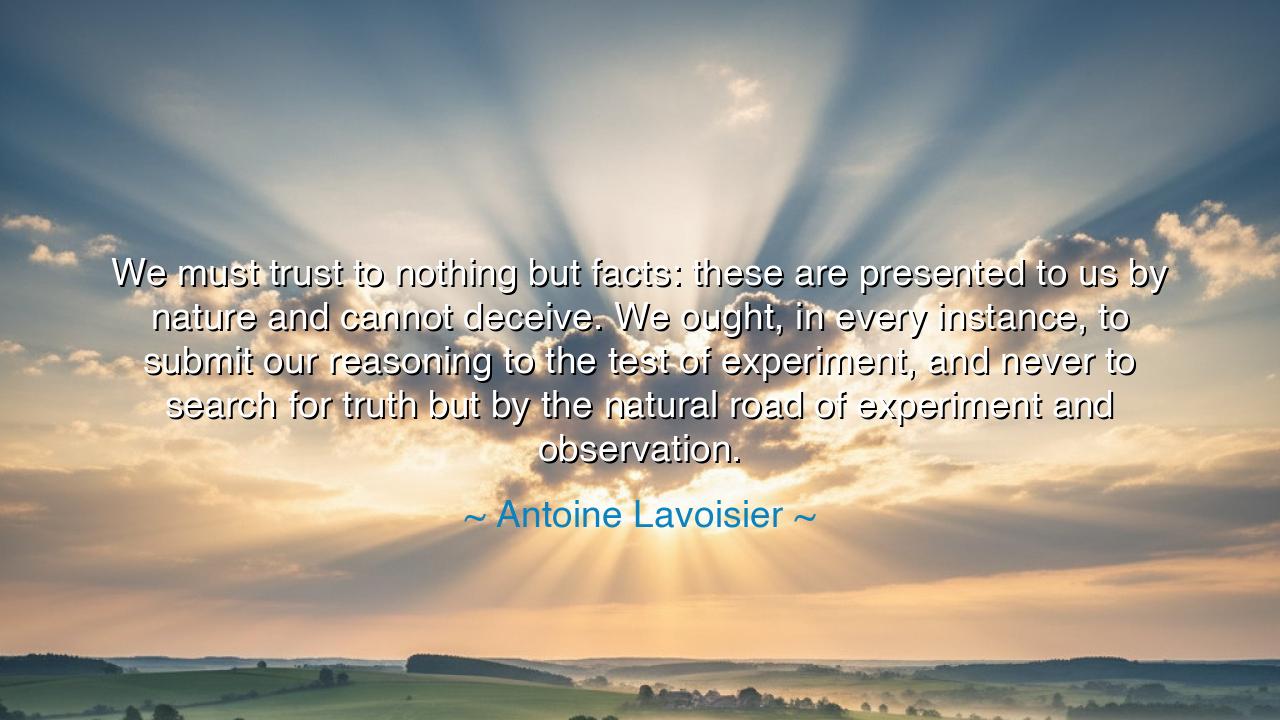
We must trust to nothing but facts: these are presented to us by
We must trust to nothing but facts: these are presented to us by nature and cannot deceive. We ought, in every instance, to submit our reasoning to the test of experiment, and never to search for truth but by the natural road of experiment and observation.






Hear the words of Antoine Lavoisier, father of modern chemistry and martyr of truth: “We must trust to nothing but facts: these are presented to us by nature and cannot deceive. We ought, in every instance, to submit our reasoning to the test of experiment, and never to search for truth but by the natural road of experiment and observation.” In this declaration, we hear the solemn creed of science, spoken with the clarity of one who gave his life to the pursuit of knowledge. His words are not dry instructions—they are a call to humility, discipline, and reverence for the order of creation itself.
The meaning of his words is powerful. Human minds are restless, ever weaving illusions, theories, and grand visions. But the facts—the raw gifts of nature—stand beyond our imagination. They are not swayed by desire, nor altered by pride. Facts endure when opinions fail. Thus Lavoisier commands us: do not build castles of thought upon sand; test all reasoning upon the stone of experiment. For in the fire of observation, falsehood crumbles, but truth remains.
The origin of this wisdom lies in the Enlightenment, an age when men sought to cast off superstition and error. Lavoisier himself shattered the ancient theory that fire was born of “phlogiston,” a false essence imagined by earlier thinkers. By careful experiments—weighing, measuring, and observing—he revealed instead the truth of oxygen, the hidden element at work in flame and breath. In doing so, he gave birth to modern chemistry. His own life is testimony: that only by bowing to the authority of experiment can humanity rise into knowledge.
History offers other examples of this path. Consider Galileo Galilei, who turned his telescope to the heavens and saw moons circling Jupiter. Against the wisdom of the day, he trusted observation, not dogma. His eyes, guided by nature, told him truths the philosophers denied. Though condemned, his discoveries endured, proving again that the road of experiment and observation is the only road to lasting truth.
O children of tomorrow, learn this: the mind alone is a trickster. It deceives with pride, with prejudice, with dreams too easily mistaken for reality. But nature does not lie. The falling stone, the flowing river, the flame that consumes—all these are teachers that speak without falsehood. To seek truth is not to imagine it, but to find it written already in the patterns of creation. The true philosopher, the true seeker, kneels before the altar of experiment, for there alone truth is revealed.
Reflect upon your own life. How often do you form judgments without testing them? How often do you cling to belief without evidence? Lavoisier’s words remind us to be humble: to submit our reasoning to the test, to verify before we believe, to look with our own eyes and listen with our own ears. This discipline is not only for the scientist in the laboratory—it is for every soul who wishes to walk the path of wisdom and not be deceived.
The lesson is clear: hold fast to facts, honor observation, and let experiment be your guide. Question boldly, but verify carefully. Do not be carried away by rumor, assumption, or the pride of untested thought. Instead, let nature herself instruct you, for she cannot deceive. In this way, your search for truth will not lead you astray, but will bring you steadily into the light.
So let the words of Lavoisier endure: “We must trust to nothing but facts.” For in facts lies freedom from delusion, in experiment lies the gateway to discovery, and in observation lies the eternal dialogue with nature. Walk that road, children, and you will walk the path of truth.






UPTruong Thai Uyen Phuong
I appreciate Lavoisier’s commitment to facts and experimentation, but I also wonder: Are there situations where facts alone can be misleading? Can facts be taken out of context or manipulated, leading to false conclusions? Shouldn’t we also consider the interpretations behind the facts, especially when dealing with complex or evolving systems? How do we ensure that our experiments and observations are truly objective, free from bias or misinterpretation?
MAMinh Anh
This quote from Lavoisier makes me think about how modern science often relies on facts to make decisions and form conclusions. But what about in situations where the facts are unclear or hard to gather? In fields like psychology or social sciences, can we always rely on strict experimentation, or do we need to incorporate more flexible or interpretive approaches? How do we adapt the scientific method when facts are not easily accessible?
GDGold D.dragon
Lavoisier’s assertion about trusting only facts and experiments resonates with the scientific method, but I wonder if there are limits to this approach. Is everything really reducible to facts and experiments, or are there aspects of reality that can’t be fully captured through observation? Does this philosophy neglect the more abstract aspects of knowledge, like ethics or emotions, which might not be measurable in a traditional scientific sense?
TDbao chau, tien dung
Antoine Lavoisier’s focus on facts and experimentation seems to emphasize the importance of empirical evidence in finding truth. But does this mean that we should dismiss other ways of knowing, like intuition or personal experience? While facts are undeniably crucial, can they ever capture the full complexity of human experience? How do we balance the scientific method with the subjective aspects of life that can’t always be tested or measured?